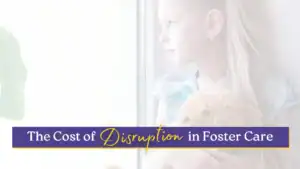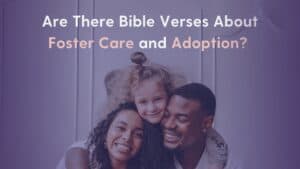Clifton Lambreth’s life is an unlikely success story. As a young boy, Clifton experienced instability with an alcoholic father and inconsistent meals. At six years old, he entered a foster home, where his foster parents laid a foundation for the rest of his life. He then spent 11 years in a group home. Clifton looks back on his life with a grateful perspective for the people who guided him as a vulnerable child.
A Chaotic Childhood
Clifton’s childhood was challenging to say the least. His parents separated when he was five years old. Then one day, without warning, Clifton’s mother took him and his two siblings and secretly relocated to another state. For one year, they lived in an at-risk community. At the time, Clifton did not understand what was happening. He remembers that he and his siblings did not eat regularly, and what they did eat was often not healthy.

During this time, Clifton’s father had hired a private investigator to find the kids. When the kids were located, Clifton’s father came and took them from school in the middle of the day. For multiple years, their mother had no idea where her children were. Clifton felt like his parents were playing chess while using their children as pawns. Unfortunately, Clifton’s father was still an alcoholic. He quickly realized he could not take care of three children while working and drinking. The sibling group entered foster care.
Foster Parents Laid a Foundation of Faith
Clifton and his siblings lived with a foster family for one year. The foster parents were loving and wanted to help the kids. While they did not have any children of their own, the couple fostered an additional five children. In total, the foster parents had eight children in their home. Clifton describes it as a “hodgepodge of a family,” but for them, it worked.
Clifton’s year in the foster home taught him many life lessons. He started first grade while living with his foster parents. Each morning, he would get on the city bus, drop in a dime for the fare, and ride to school. As a young boy without many experiences with other kids, Clifton remembers this time fondly. “Our foster parents were loving,” he recalls. “They were trying to create accountability for us. They provided for our basic needs: food and shelter. And they took us to church.”
Clifton’s biological parents were not regular church attendees. The foster home was where Clifton first learned about God. Still, he was only six years old. He did not fully understand the concept of God yet, but his foster parents laid the important foundation for the faith that Clifton would develop in the years to come.
Moving to a Group Home
After one year in the foster home, Clifton’s father advocated for his children to move to a group home. Clifton recounts how everything they owned fit in one bag when they moved. The children received a warm welcome to the group home. Still a young boy, Clifton was excited to see swing sets, tennis courts, a swimming pool, and 350 kids who could become his friends. “It was incredible to us,” Clifton says. “It was all the things we didn’t have – except our parents.”

For the next 11 years, Clifton considered the group home his true home. His house parents provided the love and stability that he had not received from his biological parents. And being surrounded by other children who had come from similar backgrounds helped Clifton not feel alone. He loved going to church and spending time with other kids.
The group home fostered Clifton’s faith. He remembers, “When I got to [the group home], they took the time to make sure my spiritual growth was equal to my physical growth and my mental growth.” In addition, there were loving caseworkers, pastors, and other staff members who poured into Clifton’s life.
The First in His Family to Attend College
Encouragement changed Clifton’s life. As Clifton got older, his house parents and others encouraged him to work hard in school. Neither of Clifton’s parents had graduated from high school, but at the group home, Clifton and his brother, Charles, were surrounded by people who had completed higher education. These people reiterated confidence in Clifton and Charles. “They told us we could do whatever we wanted [in life], and we believed them,” Clifton remarks.

With guidance from his house parents, caseworkers, pastors, and other staff, Clifton attended college. He graduated on the Dean’s list and went to graduate school to receive his MBA. Clifton attributes his success to God’s divine plan: “God used that experience to not only encourage us and direct us to go to college, but he used the people: the house parents and even our foster parents. They believed in us, and they were always encouraging us.” During holidays and school breaks, Clifton would often return to the group home.
A Life of Success After Rocky Beginnings
After completing his MBA, Clifton was hired by Ford Motor Company, where he worked for 27 years. After retiring from Ford, Clifton was able to pursue other opportunities. He is the author of three books and has spoken to hundreds of groups. Now, Clifton is the COO for Epika Studios, which creates virtual reality Bible experiences.
Clifton thinks back on his childhood with poignant gratitude. As Clifton grew older, he began to understand how much his parents had struggled. Life was challenging for them, and they did not have any love, encouragement, or energy to give their kids. Clifton considers himself blessed to have had the opportunity to grow up in a more loving environment than his biological parents could provide. He recognizes that his foster parents and house parents were living out their calling. They invested in children’s lives because they believed it was their purpose.
How Everyone Can Make a Difference

Clifton’s life was impacted by several people doing what they could to help a vulnerable child. Clifton recalls Bill, who taught him the power of hard work. He remembers another man named Thurston, who helped him prepare for college by setting up a budget. Clifton was mentored by house parents, caseworkers, staff members, and pastors at the group home. He admits that he does not even like to think about what would have happened to him if these people had not stepped up and helped him.
Pray and Take Action
Clifton wants others to see the impact they can have on vulnerable children. His advice to prospective foster/adoptive families is to pray. Consider how God may use your time, talent, treasure, and touch to impact children in foster care. Then, step out and try. Clifton knows that his success is due to the many people who stepped out to impact his life.
Become a Mentor
Not everyone is called to foster or adopt. However, there is also a huge need for mentors. Clifton received guidance and director from many different people who cared for his future. When he attended college, Clifton realized how hard it can be to navigate without someone to ask questions. Mentors are vital for young adults.
Listen to Impact Stories

Get in touch with others engaging with foster care and adoption. “Talk to people like me,” Clifton encourages. “If they tell you what these people meant in their lives, you can easily see what you can mean in someone else’s life.” As a Christian, you can also rest assured that God will provide everything you need – from patience to encouragement to resources. “While it will be challenging, the rewards are beyond your belief,” Clifton insists.
Your Next Step
If someone had not stepped up to help Clifton, his life would not have turned out as it did. His situation is not unique. There are over 400,000 children in the United States foster care system who need love and encouragement. Clifton knows from experience that there is no more rewarding role than to be someone who helps a child in need. If you are interested in learning more about foster care and adoption, visit WaitNoMore.org today.
















